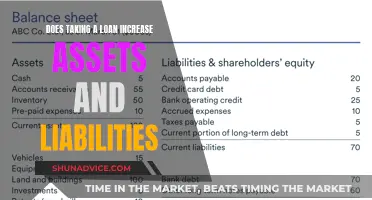
The Consumer Financial Protection Bureau (CFPB) is a US government agency that protects consumers in the financial marketplace by enforcing federal consumer financial laws. The CFPB has supervisory authority over non-depository mortgage originators and servicers, payday lenders, and private student lenders of all sizes. It also has the power to designate other non-depository institutions for supervision if their conduct poses risks to consumers. In addition, the CFPB has taken action against predatory lending practices, such as contract-for-deed loans, which often target religious and ethnic minority communities with unfair terms and high interest rates. While the CFPB does not specifically mention private trust deed loans, it does have jurisdiction over mortgage lending and consumer protection, so it may have some regulatory role in this area.
| Characteristics | Values |
|---|---|
| What is a trust deed? | A document sometimes used in real estate transactions in the U.S. |
| Who are the parties involved? | A borrower (or trustor), a lender (or beneficiary), and the trustee. |
| What is the role of the trustee? | The trustee holds the legal title until the borrower pays the debt in full, at which point the title to the property transfers to the borrower. |
| What happens if the borrower defaults? | If the borrower defaults on the loan, the trustee takes full control of the property and initiates and completes the foreclosure process. |
| What is the difference between a trust deed and a mortgage? | A mortgage involves two parties: a borrower (or mortgagor) and a lender (or mortgagee). A trust deed involves three parties. |
| Which states allow the use of trust deeds? | Alaska, Arizona, California, Colorado, Idaho, Illinois, Mississippi, Missouri, Montana, North Carolina, Tennessee, Texas, Virginia, and West Virginia. |
| Does the CFPB regulate trust deed loans? | The CFPB has taken action to stop predatory contract-for-deed investors from targeting borrowers from certain communities. |
| What is the CFPB? | The Consumer Financial Protection Bureau, created to enforce federal consumer financial laws and protect consumers in the financial marketplace. |
What You'll Learn

CFPB's jurisdiction over non-depository institutions
The Consumer Financial Protection Bureau (CFPB) has supervisory authority over non-depository institutions, including mortgage originators and servicers, payday lenders, and private student lenders of all sizes. The CFPB can also designate other non-depository institutions for supervision if there is reasonable cause to believe that the institution's conduct poses risks to consumers. This includes institutions providing services connected with loans secured by real estate, such as trust deed loans.
A trust deed, also known as a deed of trust, is a document used in real estate transactions in the United States. It involves three parties: the borrower (trustor), the lender (beneficiary), and a neutral and independent third party (trustee). The trustee holds the legal title to the property, acting as collateral for the loan, until the borrower pays off the debt in full. At this point, the title to the property is transferred to the borrower. If the borrower defaults on the loan, the trustee takes control of the property and initiates the foreclosure process.
Trust deeds are used in place of mortgages in some states, including Alaska, Arizona, California, Colorado, Idaho, Illinois, Mississippi, Missouri, Montana, North Carolina, Tennessee, Texas, Virginia, and West Virginia. They offer advantages over mortgages, such as the inclusion of a power of sale clause that allows the trustee to sell the property in the event of the borrower's default.
In the context of non-depository institutions, the CFPB has the authority to prescribe rules and require these institutions to file registration statements regarding their consumer financial products or services. The CFPB can also mandate record-keeping and reporting requirements to assess compliance with federal consumer law, obtain information about compliance systems, and detect and mitigate risks to consumers and markets.
Overall, the CFPB's jurisdiction over non-depository institutions, including those involved in trust deed loans, is focused on consumer protection and ensuring compliance with federal financial laws.
PMI and 203k Loans: What You Need to Know
You may want to see also

Trust deed loans and mortgages
A trust deed, also known as a deed of trust, is a document used in real estate transactions in the United States. It is an agreement between a borrower and a lender to have the property held in trust by a neutral and independent third party, known as the trustee, until the loan is paid off. The trustee holds the legal title to the property, while the borrower holds the equitable title, which includes the right to full ownership and the use of and responsibility for the property.
Trust deeds are used in place of mortgages in several states, including Alaska, Arizona, California, Colorado, Idaho, Illinois, Mississippi, Missouri, Montana, North Carolina, Tennessee, Texas, Virginia, and West Virginia. In contrast, some states, such as Kentucky, Maryland, and South Dakota, allow the use of both trust deeds and mortgages.
The main difference between trust deed loans and mortgages lies in the number of parties involved. A mortgage involves two parties: the borrower (or mortgagor) and the lender (or mortgagee). On the other hand, a trust deed involves three parties: the borrower (or trustor), the lender (or beneficiary), and the trustee. Additionally, in the case of a default on the loan, the foreclosure process is different for trust deed loans and mortgages. With a trust deed loan, the trustee initiates and completes the foreclosure process without seeking formal court permission. In contrast, with a mortgage, the lender will need to seek a court judgment to seize the home.
Both trust deed loans and mortgages serve the same purpose of securing repayment of a loan, with the home serving as collateral. However, the specific terms and conditions of the loan, including the interest rate, late fees, and penalties, may vary between trust deed loans and mortgages. It is important to carefully review the terms of any loan agreement before making a decision.
Car Loan Options: Tesla's Financing Plans Explored
You may want to see also

The role of trustees
A trust deed involves three parties: a borrower (or trustor), a lender (or beneficiary), and the trustee. The trustee is a third party that holds the entrusted property until the loan or debt is paid in full. The trustee holds the legal title until the borrower repays the debt, at which point the title to the property transfers to the borrower. If the borrower defaults on the loan, the trustee takes full control of the property and initiates and completes the foreclosure process.
The trustee must remain impartial and not act in the borrower's interests. They are typically a title company, escrow company, or bank, which holds the title as collateral for the promissory notes. The trustee has the responsibility of paying the proceeds from the sale to the borrower and lender after the sale is finalized. The trustee will pay the lender the amount owed on the debt and pay the borrower anything that surpasses that amount.
In the case of a deed of trust, the trustee holds the title to the property during the loan period. This differs from a mortgage, which only involves the borrower and lender and is an agreement that pledges the property as collateral for the loan. A deed of trust allows the lender to bypass the court system and initiate a non-judicial foreclosure, which is faster and less expensive.
The selection of a trustee for a deed of trust is important. Commercial lenders typically select the trustee, which is usually a title company or professional escrow entity. Some states have laws regulating who can act as a trustee, with requirements such as being a lawyer, title insurance company, bank, or other institutions permitted by statute. Other states, such as Colorado, have established public trustees in every county to handle deeds of trust. When the loan is obtained from a private entity, the parties involved must agree on a third-party trustee.
Tesla Loans: What You Need to Know
You may want to see also

CFPB's consumer protection efforts
The Consumer Financial Protection Bureau (CFPB) is an independent agency of the United States government, established in response to the financial crisis of 2007-2008 and the subsequent Great Recession. The CFPB's primary role is to protect consumers in the financial sector.
The CFPB has a broad jurisdiction, including banks, credit unions, securities firms, payday lenders, mortgage-servicing operations, foreclosure relief services, debt collectors, for-profit colleges, and other financial companies operating in the United States. The Bureau also has supervisory authority over non-depository mortgage originators and servicers, payday lenders, and private student lenders of all sizes.
One of the CFPB's key consumer protection efforts is to ensure that financial institutions comply with bank regulatory laws. The Bureau implements and enforces regulations such as the Equal Credit Opportunity Act, the Home Mortgage Disclosure Act, the Fair Debt Collection Practices Act, and the Fair Credit Reporting Act. These regulations aim to protect consumers' rights and ensure fair and transparent practices in the financial industry.
The CFPB also provides educational materials and resources to consumers, empowering them to make informed financial decisions. For example, the CFPB created "Ask CFPB," a tool that provides plain-language answers to personal finance questions. Additionally, the CFPB has taken steps to protect consumers' data privacy and security, such as taking enforcement action against companies that fail to safeguard consumers' information.
Furthermore, the CFPB works to make financial disclosures clearer and more transparent. This includes making credit card, mortgage, and loan agreements easier to understand, so consumers can be fully aware of their rights and responsibilities. The CFPB has also created tools like "Paying for College," which helps students estimate the cost of attending university and make informed financial decisions about their education.
In addition to its regulatory and educational efforts, the CFPB has the authority to supervise financial institutions and examine their compliance with the law. This includes the power to designate non-depository institutions for supervision if there is reasonable cause to believe that the institution's conduct poses a risk to consumers. The CFPB uses technology to monitor how financial entities use social media and algorithms to target consumers, ensuring that they are not being unfairly targeted or taken advantage of.
Texas Interlibrary Loan System: How Does It Work?
You may want to see also

CFPB's supervisory authority
The CFPB (Consumer Financial Protection Bureau) has supervisory authority over a range of institutions and entities. The Dodd-Frank Wall Street Reform and Consumer Protection Act created the CFPB and gave it consumer protection oversight authority, allowing it to monitor and enforce compliance with federal consumer financial laws and regulations.
The CFPB has jurisdiction over depository institutions, including banks, thrifts, and credit unions with assets over $10 billion, as well as their affiliates. This includes the examination of these institutions to ensure compliance with consumer financial laws. The CFPB also has the authority to supervise nondepository institutions, such as mortgage originators and servicers, payday lenders, and private student lenders of all sizes.
In certain specific markets, the CFPB can oversee nonbank compliance, regardless of size. These markets include mortgage companies, payday lenders, and private education lenders. The CFPB may also designate other nondepository institutions for supervision if there is reasonable cause to believe that the institution's conduct poses a risk to consumers.
The purpose of the CFPB's supervision program is to assess compliance with federal consumer financial laws, understand the activities and compliance systems of supervised entities, and detect and evaluate risks to consumers and the consumer financial markets. The Supervision and Examination Manual guides the CFPB's examiners in overseeing companies that provide consumer financial products or services, ensuring consistent supervisory coverage.
Texas Loan Prepayment: Are There Penalties?
You may want to see also
Frequently asked questions
A trust deed, also known as a deed of trust, is a document used in real estate transactions when one party has taken out a loan from another to purchase a property. The deed represents an agreement between the borrower and lender to have the property held in trust by a neutral third party until the loan is paid off.
The CFPB, or Consumer Financial Protection Bureau, was created to enforce federal consumer financial laws and protect consumers in the financial marketplace. The CFPB writes rules, supervises companies, and enforces the law to root out unfair, deceptive, or abusive acts or practices.
The CFPB has supervisory authority over non-depository mortgage originators and servicers, payday lenders, and private student lenders. While the CFPB does not specifically mention trust deed loans, it does have authority over non-depository institutions if there is reasonable cause to determine that the institution's conduct poses risks to consumers. Therefore, it is possible that the CFPB could regulate private trust deed loans if they fall under this category and pose risks to consumers.







